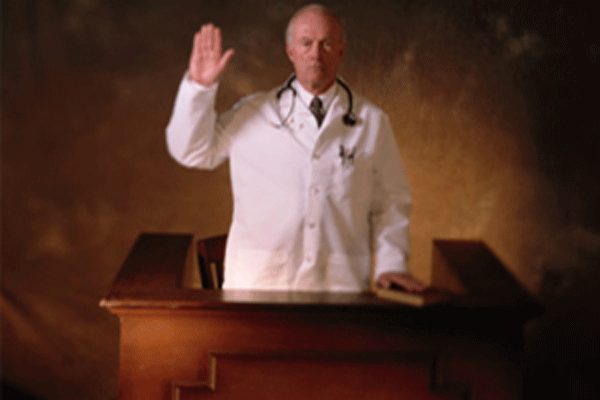
Expert witnesses are a necessary evil in your run of the mill personal injury case. We are not allowed to simply say that our client broke her wrist in the crash when her airbag went off. Even if the client’s medical records support this statement. The allegation that the other driver’s negligence caused your wrist fracture must be supported by qualified medical testimony and that testimony must be subject to cross-examination. The medical records alone are considered hearsay as they are an out of court statement offered into evidence to prove the truth of the matter. The actual person making the statement of causation in the medical record must come in and testify to her opinion. Or, the record is not admissible and you cannot prove your case. Nine times out of ten, doctors of any expertise do not want to participate in litigation. Why is that? Because, litigation is a pain in the butt. Lawyers are unreasonable. We want you as the doctor to make judgments that a lumbar disc injury was definitely caused by the car crash and doctors generally don’t worry too much about what caused what. Their job is to treat the patient, not decide how the injury occurred.
So, what is the solution? Well, while I would much prefer to have the client’s treating doctor give her opinions in the lawsuit, I am not usually so lucky. So, when clients’ doctors do not want to participate, we hire physicians who have a side job as an expert witness. Often, these experts will make more money doing expert work than they do in their medical jobs. However, what is important for me is that experts are well-qualified and experienced in dealing with cross-examination. There are good and bad experts on both sides. There are some who are way overused and some who are too old to keep up with changes in medicine, the law, or the lawyers. For example, an orthopedic surgery who no longer practices surgery loses a lot of credibility in my book. Or, a neurologist who makes $250,000 annually working for insurance companies and rarely working for plaintiffs. In both cases, the defense expert is easily characterized as not wanting to lose their $250,000 income and hence they always find that the insurer is correct, the plaintiff was not harmed and the crash or incident did not cause injury.
What is most helpful in my cross-examinations is when the defense expert is not fully prepared. That often becomes apparent when they were not given the chance to examine my client or when they were not given my client’s deposition. In auto negligence cases, most of the time, defense counsel are too busy to fully prepare their experts and hence their experts are left hanging out to dry when they are cross-examined. In medical malpractice cases, where the stakes are often higher in dollar value, the defense experts are far better prepared and better credentialed on the defense side.
I strongly believe that you should not be crossing a defense expert unless you are able to go toe to toe with the expert on the medical basis for their opinion. You don’t have to be an expert in spinal surgery to cross a surgeon. But, you do have to be able to show that there are holes in their opinion. If you cannot do that, you are not fully prepared in my book. There are experts who are simply good experts and are hard to cross. That is part of lawyering. But, I have run into too many of my colleagues who don’t do the hard work because they don’t think that they can ever cross a doctor and win. That is the best part! When the doctor says, “you are right” to me during a cross, I know I have won the case. The last time that happened the defense lawyer asked for my card and asked if he could send me cases in the future. That’s a win!
